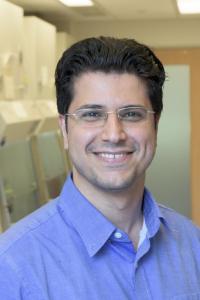Hani Goodarzi, PhD

Hani Goodarzi, PhD
Education
Biography
Hani Goodarzi, PhD came to UCSF in 2016 from Rockefeller University in New York City where he was a Ruth Kirschstein and Anderson Cancer Center postdoctoral fellow. He completed his PhD dissertation, entitled “Experimental and Computational Approaches for Genetic Dissection of Complex Phenotypes,” at Princeton University in November 2010 in Molecular Biology. During his postdoctoral tenure at the Laboratory of Systems Cancer Biology at Rockefeller University, he discovered several previously uncharacterized post-transcriptional regulatory pathways that drive breast cancer progression and was awarded the Blavatnik Regional Award and The Tri-Institutional Breakout Prize for Junior Investigators. Most recently, for his contributions to cancer research, he was awarded the Martin and Rose Wachtel Award in Cancer Research and was named a Kimmel scholar.
Research Interests
Our group is a multidisciplinary lab focused on developing integrated computational and experimental technologies that enable the systematic identification of regulatory mechanisms that drive cancer progression and metastasis. For cancer to spread, genes involved in the metastatic process must be altered. This dysregulation largely arises from modulations in the regulatory processes that govern gene expression dynamics. While post-transcriptional regulatory programs are responsible for the fate of RNA molecules in the cell, systematic studies of pathological aberrations in these pathways remain elusive.
Using computational, biochemical, and functional genomic tools, we aim to address the following biological problems: (1) What are the regulatory programs, both transcriptional and post-transcriptional, that govern aberrant RNA processing and expression in cancer cells? (2) What are the roles of higher-order inter-molecular interactions, including RNA-RNA, RNA-protein, and protein-protein interactions, in shaping the post-transcriptional regulatory networks? (3) What is the contribution of RNA structure to the definition of RNA-mediated interactions and their regulatory consequences? Finding solutions to these problems is a crucial step towards understanding how aberrant activity of post-transcriptional regulatory pathways help initiate and maintain the transformation process. Ultimately, we aim to target these pathological programs, in adjuvant or neoadjuvant settings, to inhibit the progression of metastatic tumors.
Academic Contact
Hani Goodarzi
Assistant Professor
Department of Biochemistry and Biophysics
Department of Urology
Helen Diller Family Comprehensive Cancer Center
Institute for Computational Health Sciences
University of California, San Francisco
Genentech Hall, S312D
600 16th St
San Francisco, CA 94158
Phone: 415-230-5189
